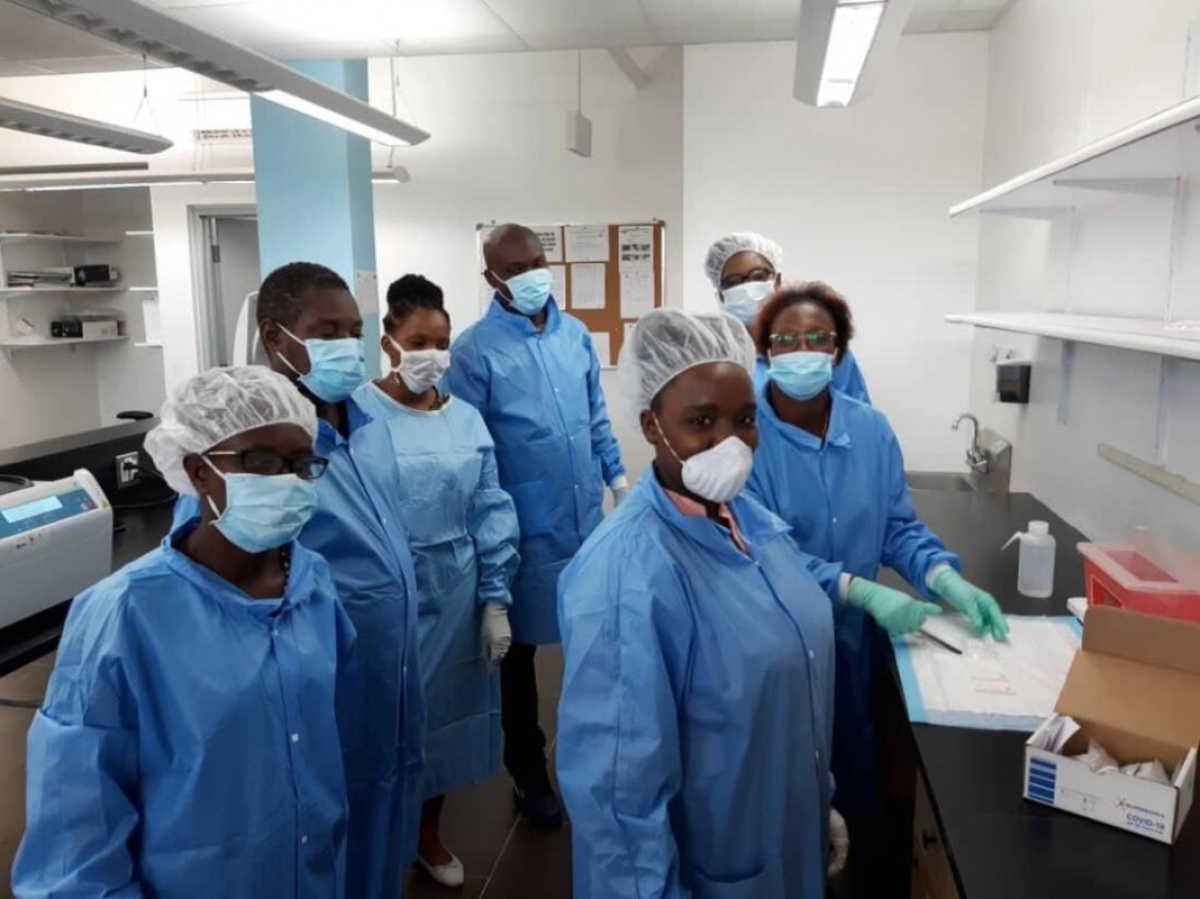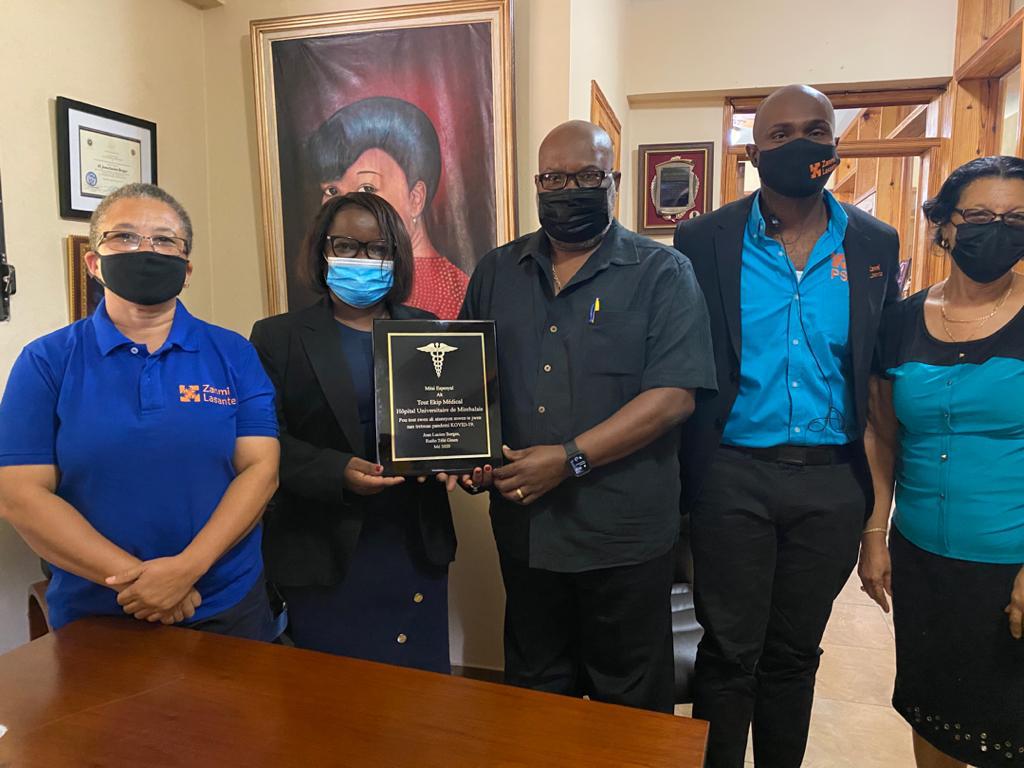Providing High-Quality COVID-19 Care In Haiti, Amid Significant Challenges
Oxygen shortages, severe cases, unrest among obstacles overcome by “weary” clinicians
Posted on Jul 26, 2021

As some parts of the world prepare for their new normal, Haiti is still facing the harsh reality of COVID-19. The country was long thought to have been spared by the disease, but cases are rising at an alarming rate as the nation is in the midst of another wave of infections and heightened political turmoil, following the July 7th assassination of President Jovenel Moïse.
Through it all, Zanmi Lasante (ZL), Partners In Health’s sister organization in Haiti, has kept its doors open, ensuring the safety of staff and delivering care to patients. In the early months of 2020, the team developed a COVID-19 task force and a preparedness plan to support the Ministry of Health. They also conducted an assessment of their 15 hospitals and clinics to quickly set up treatment centers for COVID- 19 patients.
Over the course of a few weeks, three sites were selected— Hôpital Universitaire de Mirebalais (HUM), Saint-Nicolas Hospital in Saint-Marc and Hôpital Sainte-Thérèse in Hinche—73 beds prepped, and the facilities equipped with an adequate number of trained staff, sufficient materials and supplies, and water, sanitation and hygiene infrastructure. Each site established a testing center, quarantine spaces for patients and staff awaiting test confirmation, and an infectious disease unit to treat patients testing positive for COVID-19.
Because of this preparation, Zanmi Lasante marked several major milestones in pandemic response. HUM became the first institution in Haiti to treat COVID-19 patients in March 2020. It was also the first and only institution to save the life of a COVID-19 patient who had slipped into a coma; clinicians continue to care for some of the most severe cases of COVID-19 in the country. And staff were the first to work on the border with the Dominican Republic to test tens of thousands of migrants over the past year.
Among the patients treated at HUM is Jean-Lucien Borges, director of Radio Ginen, one of the top radio stations in the country.
“I want to express my gratitude to the entire HUM staff, the nurses, doctors, the entire medical team for the care I received during my stay at the hospital. I can attest on behalf of all the people who have been treated by this team that we wouldn’t be here today if it wasn’t for them putting their life at risk to give us the care we desperately needed,” Borges said during a recent interview.

Overcoming challenges
These lifesaving moments are particularly impressive, considering the significant challenges the staff and country itself are facing—not least of which include the recent assassination, gang violence, fuel shortages, and rampant inflation.
While Haiti had managed to avoid a significant increase in cases since last summer, the arrival of the British and Brazilian variants through the reopening of airports and borders triggered an explosion of new cases. In December 2020, Haiti saw an increase in travelers as people returned for the holidays and, in February, Carnival was celebrated outside of the capital with large crowds of locals and foreigners. For several months, social distancing had been forgotten, sold out events were being held weekly, and public transport was full.
Dr. Kenia Vissières, ZL’s care and community support program director and a member of the COVID-19 task force, believes the severity of the second wave may be due in part to Haitians’ distrust of authorities and skepticism of the dangerousness or even the existence of COVID-19.
“Very few people wear masks across the country where schools, shops, churches, and markets generally operate without respecting social distancing,” she said. “Realistically, these measures cannot be applied by the poorest inhabitants of Haiti, who survive only thanks to the informal economy.”
Indeed, following the eight-day state of emergency declared in April, street merchants held demonstrations in markets throughout the country against what they called “oppressive measures” to restrict their activities. In Haiti, many people live on less than $2 a day and earn a living through the informal economy. Sheltering in place and working from home are luxuries most Haitians can't afford; they are forced to choose between dying from COVID-19, or dying of hunger.
Haiti lacks a nationwide sanitation system, many people do not have running water, and there is insufficient public infrastructure to promote handwashing and other prevention measures against COVID-19, which means disease can spread fast, especially where impoverished neighborhoods are densely packed.
“It’s also worth noting that common COVID-19 symptoms like fever, dry cough, headache, body aches, nasal congestion, loss of taste and smell, fatigue, etc. are trivialized by the population,” Vissières said. “These symptoms are typically associated with what they call a ‘small fever’ that can be treated using herbal medicine and teas.”
Responding to a second wave
Vissières was part of a team of health care professionals that conducted an assessment of 21 hospitals and health care centers throughout Haiti in May 2021. They determined that the vast majority could only offer basic diagnosis and were not equipped with the personnel, medical supplies, and infrastructure necessary to manage COVID-19 patients. Therefore, almost all positive cases have been referred to the Zanmi Lasante network.
There hadn’t been any new cases at HUM for some time, and the 50-beds dedicated to COVID-19 cases had been reassigned to other services, such as women's health and maternity.
“We had been settling back into our regular workflow, but we were suddenly getting new and more complicated cases at an alarming rate, and these cases required more specialized care,” said Thamar Julmiste, HUM’s chief nursing officer. “We had to set up a new infectious disease unit in the orthopedics unit since it was the closest building to the hospital entrance.”
Faced with these challenges, the hospital's leadership put in place updated protocols to ensure the effective management of new cases through pre-triage, triage, isolation, and care. And various infection prevention measures were reinforced to minimize contamination of staff.
Dr. Christophe Millien, HUM’s chief medical officer, was confident in his staff’s capacity to meet the surge: “We have doctors and senior residents in emergency medicine, anesthetists, and internists alongside the nurses who form a multidisciplinary clinical team for the care of patients. The availability of national and international intensive care physicians and pulmonologists represents a major asset in improving the quality of care.”
Yet, considering the number of critical cases coming their way, Loune Viaud, Zanmi Lasante’s executive director, knew the team would need more anesthesiologists, emergency doctors, specialized nurses, and personal protective equipment over long-term response.
Oxygen was already in short supply, Julmiste noted: “These new cases present acute respiratory failure that require intubation. The hospital’s oxygen generator has the capacity to fill a maximum of 50 cylinders per day, and now we were using up to 250 canisters in a single day.”
Zanmi Lasante can produce 90 cylinders of oxygen per day, 50 at HUM and 40 at its Cange facility. However, they have had to outsource more canisters from other health care facilities or buy more to meet the needs of patients—such as premature infants in the NICU. It is estimated that the hospital needs to have 500 tanks filled to best be prepared.
“HUM is the reference institution for all critical cases, and our medical staff has been working non-stop for the past 14 months,” Julmiste said. “They are exhausted and weary of these new variants of the virus. They are still pushing forward through it all, but, these preventable deaths are taking a toll on staff morale.”
Support PIH's Work
Haiti needs solidarity and hope now more than ever. Civil unrest, COVID, Hurricanes...whatever comes our way, we’re not going anywhere.
Your donation is:
- Tax-deductible
- 100% Secure
- Effective, as 90% of every gift goes straight to those in need

